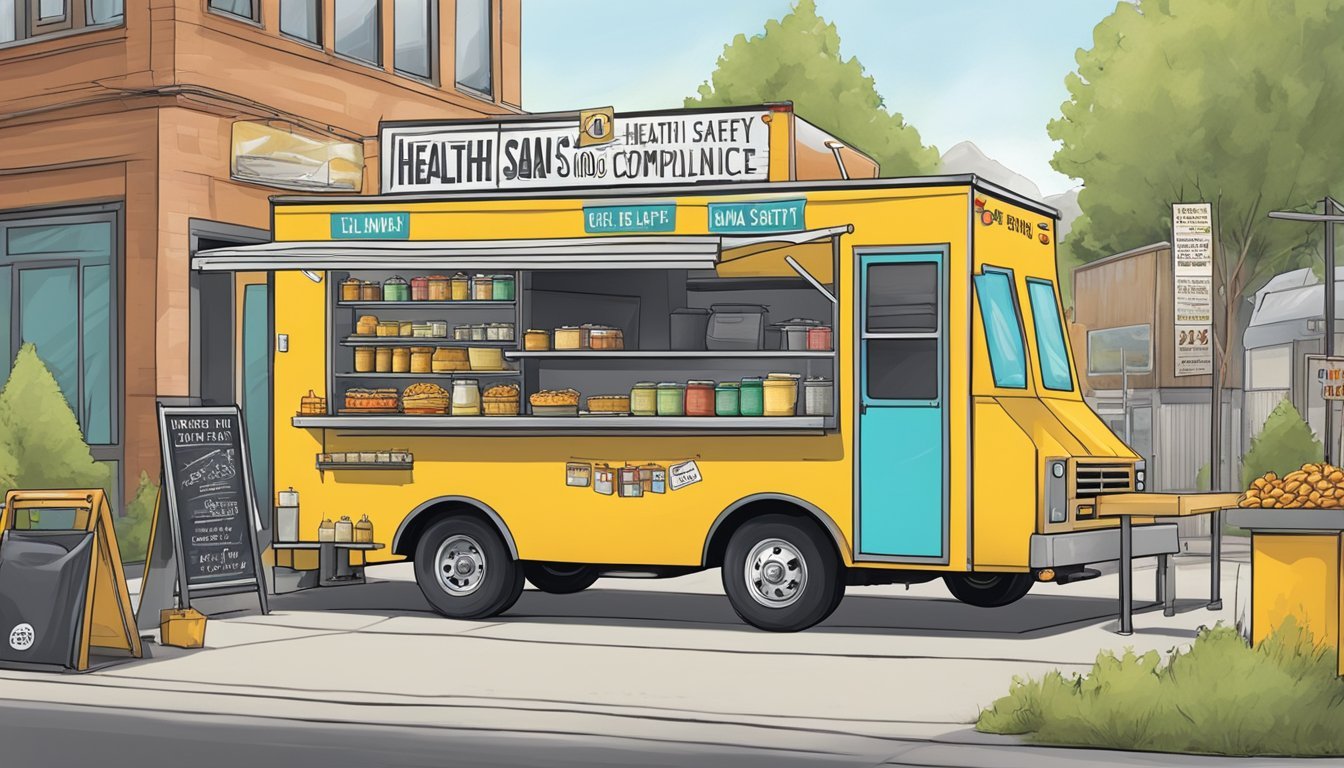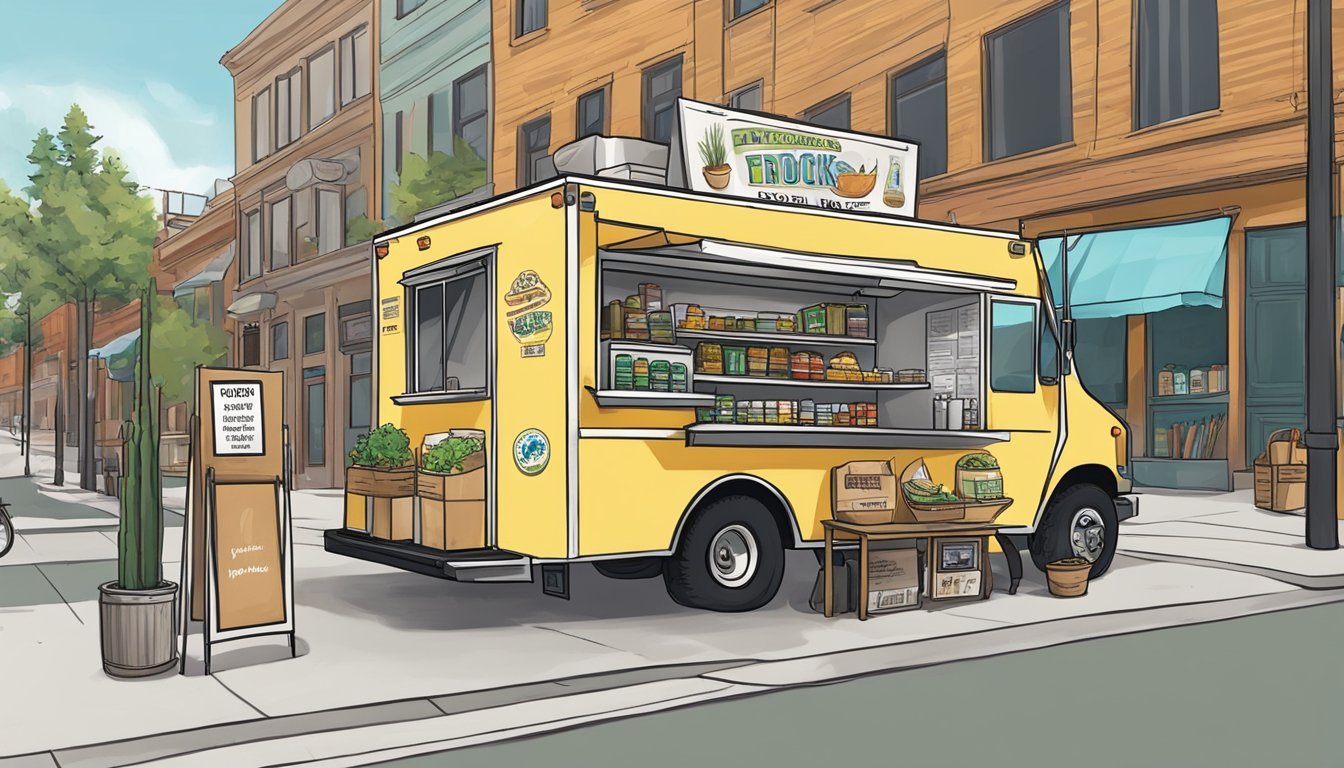Food Truck Laws in Wyoming
Navigating Regulations and Compliance
Operating a food truck in Wyoming requires navigating a series of laws that ensure public health and safety, as well as compliance with various regulatory measures. Wyoming's food truck entrepreneurs must acquire specific licenses and permits akin to those needed by traditional brick-and-mortar restaurants. These include a business license, food handlers permits for each employee, and a seller's permit. Additionally, food trucks need a designated food truck license, also identified as a mobile food facility permit, which the official guidelines refer to as a Mobile Vendor License in some jurisdictions.
Health and safety are also paramount in the state's regulations, with food trucks being mandated to have adequate handwashing facilities and appropriate food storage and preparation areas. Systems must be in place to prevent any potential contamination, with regular inspections carried out to ensure adherence to these requirements. Mobile food businesses are also subject to local zoning laws and must secure appropriate permissions before parking and operating in various locations across the state.
Understanding and complying with the complexities of Food Truck Laws in Wyoming is essential for any mobile food business looking to succeed. From securing the right permits to ensuring proper food safety practices, the framework is designed to protect both the business investment and the well-being of consumers. It's these considerations that make the foundation for starting and running a food truck in Wyoming.
Starting a Food Truck Business
When initiating a food truck venture in Wyoming, entrepreneurs must navigate through a sequence of legal and regulatory measures to establish a sound business foundation. It is crucial for an entrepreneur to select an appropriate business structure, obtain necessary licenses, and meet specific food truck requirements to operate successfully.
Business Structure
Deciding on a business structure is the first step for any aspiring food truck owner. Entrepreneurs have the choice of forming an LLC (Limited Liability Company), a sole proprietorship, or a partnership. An LLC is often preferred for its liability protection and tax benefits. A sole proprietorship may be suitable for single-owner operations, while a partnership could be ideal for multiple owners. Each structure has unique implications for taxation, liability, and ongoing requirements.
Choosing a Business Name
Selecting a unique and memorable business name is essential for branding and legal compliance. This name should reflect the type of food offered and resonate with the target audience. The chosen name must be checked for availability and then registered with the Wyoming Secretary of State to ensure no other entity is operating under the same name.
Applying for EIN and Registering the Business
Obtaining an Employer Identification Number (EIN) is a critical step for tax identification purposes and is required for hiring employees. After securing an EIN, the food truck business must be registered with the state of Wyoming. Registration involves filing the necessary paperwork and adhering to local government regulations, which lays the groundwork for obtaining a business license.
Food Truck Specifics and Requirements
In Wyoming, a food truck is more than just a vehicle; it's a mobile kitchen that must adhere to various state-specific regulations concerning storage, preparation, and cooking. Entrepreneurs need to choose a vehicle that can support the requisite equipment for their menu items and abide by health and safety standards. Additional requirements may include having an accessible and compliant location for additional prep space and ensuring proper food handling and storage practices are followed.
Legal Requirements
Navigating through the legal maze to run a food truck in Wyoming necessitates a firm understanding of the intricate interplay between state mandates, local directives, zoning norms, and insurance obligations. Each facet is critical to ensuring operational compliance and protecting the business from legal complications.
State and Local Regulations
In Wyoming, food trucks are seen as equivalent to restaurants when it comes to permitting. Operators are required to procure a business license, alongside a food truck specific license, formally known as a mobile food facility permit. Additionally, each employee working on the food truck must possess a valid food handlers permit. It is crucial for food trucks to undergo regular inspections to maintain health and safety standards and demonstrate continual compliance with the stipulated health requirements.
Zoning and Location Rules
Food truck owners must also be diligent in adhering to zoning laws that dictate where food trucks may be stationed. Specific locations may require explicit parking permissions, highlighting the importance of being fully aware of where a food truck is legally permitted to operate. All food trucks must procure a seller's permit, signifying compliance with jurisdictional sales tax regulations.
Insurance Coverage
Liability insurance is non-negotiable for food truck operations in Wyoming. Operators must secure an adequate insurance policy that covers potential incidents and claims arising from their business activities. Staying insured not only aligns with legal requirements but also provides a safety net against the financial repercussions of unforeseen events, ensuring the food truck's longevity and fiscal stability.
Health and Safety Compliance
In Wyoming, food trucks must adhere to rigorous health and safety regulations to operate legally and ensure public safety. Achieving and maintaining compliance involves acquiring the necessary permits, passing inspections, and ensuring that all employees receive proper food handling training.
Public Health Permit
To operate a food truck in Wyoming, obtaining a Public Health Permit is a fundamental requirement. This permit signals that a food truck meets the minimum standards set for cleanliness, food safety, and public health within the jurisdiction. Applications for this permit are reviewed by local health departments, which assess various aspects including the adequacy of food source and storage, and facilities for maintaining food temperature.
Food Safety Standards Inspection
Regular inspections are carried out by local health departments to ensure that food trucks comply with prescribed food safety standards. These inspections cover a multitude of criteria:
Refrigeration: All perishable items should be kept at safe temperatures to forestall bacterial growth.
Cleanliness Protocols: Surfaces, utensils, and equipment must be sanitized regularly to prevent contamination.
Storage and Preparation Areas: Food must be stored and prepared in a manner that reduces the risk of foodborne illnesses.
Adherence to these protocols is paramount for continued operation and public trust in the food truck's commitment to safety.
Employee Food Handling Training
All food truck employees in Wyoming must undergo training centered on safe food handling practices. This training typically encompasses:
Proper handwashing techniques
Cross-contamination prevention
Safe cooking temperatures
Allergy awareness
This guarantees that staff are informed about the latest safety and cleanliness standards, ensuring the wellbeing of customers. Training not only minimizes health risks but also reinforces the truck's reputation for quality and care.
Operational Aspects
When starting a food truck in Wyoming, operators must navigate the licensing process and adhere to stringent inspection and waste management protocols. These operational aspects are critical for maintaining the safety and sustainability of the mobile food industry in the state.
Licensing Process and Fees
The licensing process for food trucks in Wyoming begins with the application submitted to the local health department. Applicants must provide detailed information about their food truck, including menu, food preparation procedures, and employee health policies. License fees vary based on location and type of service but are essential for legal operation. For instance, information from Understanding Wyoming Food Truck Requirements: A Comprehensive Guide indicates that operators must account for local zoning laws when applying for permits.
Food Truck Inspection
Once licensed, food trucks undergo regular inspections to ensure compliance with Wyoming's health and safety regulations. Inspectors focus on critical factors such as handwashing facilities, correct food storage and preparation areas, and contamination prevention measures. Food trucks must pass these inspections to remain licensed and operational, as highlighted by insights found in Food Truck and Mobile Catering Business in Wyoming.
Waste Disposal Management
Effective waste disposal management is a requirement for maintaining a food truck’s license. Operators must have a plan to address litter, wastewater, and grease disposal. The plan should include partnerships with approved waste disposal services and compliance with local ordinances. Proper disposal is not only a legal obligation but also a matter of public health and environmental responsibility, a point underscored by the regulatory framework accessed via Food Truck Requirements in Wyoming - Food Handler's Guide.
Financial Considerations
When operating a food truck in Wyoming, owners must navigate various financial obligations, from handling sales tax to managing income and expenses. Staying compliant with state and federal tax guidelines is crucial, as is meticulous financial tracking for business sustainability.
Handling Sales Tax
In Wyoming, food truck businesses are required to collect sales tax on the food and beverages they sell. The sales tax rate may vary by locality, and timely payments are enforced by the state's Department of Revenue. Operators must register for a sales tax permit and regularly submit sales tax returns. Businesses can find guidance on complying with these regulations through resources like food truck licenses and permits in Wyoming.
Sales Tax Registration: A one-time application fee is associated with this process.
Sales Tax Payment: Payments are usually made on a monthly or quarterly basis.
Managing Income and Expenses
A food truck's financial health hinges on the effective management of its income and the expenses it incurs. Income must be carefully recorded, as it directly affects the federal taxes owed, overseen by the IRS. It's important for food truck owners to:
Track all income: Maintain thorough records of daily earnings.
Itemize deductions: List all business-related expenditures to accurately reflect profit and loss.
Expenses typically include the cost of ingredients, vehicle maintenance, and employee wages. Keeping precise records is not only beneficial for understanding the business's financial state but is also a requirement come tax time.
Local Resources and Support
Wyoming offers a variety of resources and support at the county level and provides accessible information on state legislation for food truck operators. These resources are designed to foster economic growth and ensure compliance with local laws.
County-Level Resources
Every county in Wyoming provides specific resources targeted to assist food truck businesses flourish. Operators can find economic development agencies, such as the Laramie County Economic Development Agency, that offer guidance on starting and running a business. These agencies are pivotal in providing local market insights and arranging networking opportunities with other food truck owners.
At the county level, permits and health code regulations are often accessible through county websites or local health departments. For instance, prospective entrepreneurs in Natrona County can visit the Natrona County Health Department to obtain necessary food handlers permits and review safety protocols.
State Legislation Information
Staying informed about state legislation that impacts food truck operations is crucial. The Wyoming Legislature keeps a comprehensive database of bills and statutes, including those governing food trucks. The website details specific legal requirements, such as House Bill No. HB0128, and provides PDF documents for in-depth understanding of the applicable laws.
Food truck proprietors can also glean important legal requirements from legislative summaries and resources designed to simplify complex regulations. For example, HB0179 modifies existing statutes to present clear guidelines on the operation of food trucks within the state. These well-documented resources are invaluable for ensuring compliance and avoiding legal pitfalls.
By utilizing these resources at both the county and state level, food truck operators are better equipped to navigate the complexities of the food service industry within Wyoming.
Additional Considerations
When delving into the food truck business in Wyoming, operators must navigate complex regulations beyond basic licensing. Two pivotal areas are alcohol permitting and integration with the mobile food vendor community.
Alcohol Permitting
Food trucks that plan to serve alcohol must apply for a special permit, as regular food truck licenses do not cover alcohol sales. They must meet specific regulations set by the state and local authorities, including completing responsible beverage service training for staff. Regulations can vary by county, so it's essential for operators to obtain the correct information for their area.
Mobile Food Vendor Community
Belonging to a mobile food vendor community can offer significant benefits, including shared knowledge on navigating local regulations and zoning laws. Engaging with networks like the Wyoming Food Truck Association can provide valuable support and advocacy when dealing with bureaucratic challenges and shaping statewide legislation that impacts mobile food vendors.









